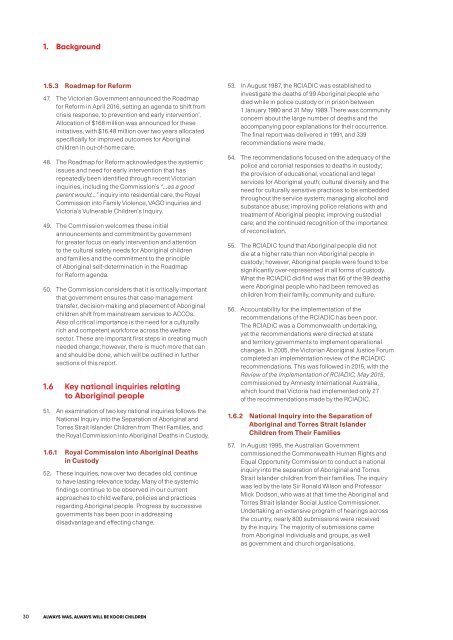ALWAYS WAS ALWAYS WILL BE KOORI CHILDREN
2dHjhRC
2dHjhRC
Create successful ePaper yourself
Turn your PDF publications into a flip-book with our unique Google optimized e-Paper software.
1. Background<br />
1.5.3 Roadmap for Reform<br />
47. The Victorian Government announced the Roadmap<br />
for Reform in April 2016, setting an agenda to ‘shift from<br />
crisis response, to prevention and early intervention’.<br />
Allocation of $168 million was announced for these<br />
initiatives, with $16.48 million over two years allocated<br />
specifically for improved outcomes for Aboriginal<br />
children in out-of-home care.<br />
48. The Roadmap for Reform acknowledges the systemic<br />
issues and need for early intervention that has<br />
repeatedly been identified through recent Victorian<br />
inquiries, including the Commission’s “…as a good<br />
parent would…” inquiry into residential care, the Royal<br />
Commission into Family Violence, VAGO inquiries and<br />
Victoria’s Vulnerable Children’s Inquiry.<br />
49. The Commission welcomes these initial<br />
announcements and commitment by government<br />
for greater focus on early intervention and attention<br />
to the cultural safety needs for Aboriginal children<br />
and families and the commitment to the principle<br />
of Aboriginal self-determination in the Roadmap<br />
for Reform agenda.<br />
50. The Commission considers that it is critically important<br />
that government ensures that case management<br />
transfer, decision-making and placement of Aboriginal<br />
children shift from mainstream services to ACCOs.<br />
Also of critical importance is the need for a culturally<br />
rich and competent workforce across the welfare<br />
sector. These are important first steps in creating much<br />
needed change; however, there is much more that can<br />
and should be done, which will be outlined in further<br />
sections of this report.<br />
1.6 Key national inquiries relating<br />
to Aboriginal people<br />
51. An examination of two key national inquiries follows: the<br />
National Inquiry into the Separation of Aboriginal and<br />
Torres Strait Islander Children from Their Families, and<br />
the Royal Commission into Aboriginal Deaths in Custody.<br />
1.6.1 Royal Commission into Aboriginal Deaths<br />
in Custody<br />
52. These inquiries, now over two decades old, continue<br />
to have lasting relevance today. Many of the systemic<br />
findings continue to be observed in our current<br />
approaches to child welfare, policies and practices<br />
regarding Aboriginal people. Progress by successive<br />
governments has been poor in addressing<br />
disadvantage and effecting change.<br />
53. In August 1987, the RCIADIC was established to<br />
investigate the deaths of 99 Aboriginal people who<br />
died while in police custody or in prison between<br />
1 January 1980 and 31 May 1989. There was community<br />
concern about the large number of deaths and the<br />
accompanying poor explanations for their occurrence.<br />
The final report was delivered in 1991, and 339<br />
recommendations were made.<br />
54. The recommendations focused on the adequacy of the<br />
police and coronial responses to deaths in custody;<br />
the provision of educational, vocational and legal<br />
services for Aboriginal youth; cultural diversity and the<br />
need for culturally sensitive practices to be embedded<br />
throughout the service system; managing alcohol and<br />
substance abuse; improving police relations with and<br />
treatment of Aboriginal people; improving custodial<br />
care; and the continued recognition of the importance<br />
of reconciliation.<br />
55. The RCIADIC found that Aboriginal people did not<br />
die at a higher rate than non-Aboriginal people in<br />
custody; however, Aboriginal people were found to be<br />
significantly over-represented in all forms of custody.<br />
What the RCIADIC did find was that 66 of the 99 deaths<br />
were Aboriginal people who had been removed as<br />
children from their family, community and culture.<br />
56. Accountability for the implementation of the<br />
recommendations of the RCIADIC has been poor.<br />
The RCIADIC was a Commonwealth undertaking,<br />
yet the recommendations were directed at state<br />
and territory governments to implement operational<br />
changes. In 2005, the Victorian Aboriginal Justice Forum<br />
completed an implementation review of the RCIADIC<br />
recommendations. This was followed in 2015, with the<br />
Review of the Implementation of RCIADIC, May 2015,<br />
commissioned by Amnesty International Australia,<br />
which found that Victoria had implemented only 27<br />
of the recommendations made by the RCIADIC.<br />
1.6.2 National Inquiry into the Separation of<br />
Aboriginal and Torres Strait Islander<br />
Children from Their Families<br />
57. In August 1995, the Australian Government<br />
commissioned the Commonwealth Human Rights and<br />
Equal Opportunity Commission to conduct a national<br />
inquiry into the separation of Aboriginal and Torres<br />
Strait Islander children from their families. The inquiry<br />
was led by the late Sir Ronald Wilson and Professor<br />
Mick Dodson, who was at that time the Aboriginal and<br />
Torres Strait Islander Social Justice Commissioner.<br />
Undertaking an extensive program of hearings across<br />
the country, nearly 800 submissions were received<br />
by the inquiry. The majority of submissions came<br />
from Aboriginal individuals and groups, as well<br />
as government and church organisations.<br />
30 <strong>ALWAYS</strong> <strong>WAS</strong>, <strong>ALWAYS</strong> <strong>WILL</strong> <strong>BE</strong> <strong>KOORI</strong> <strong>CHILDREN</strong>


